The United States of America, USA, has unceasingly infringed on the United Nations, UN, charter and the ultimatum passed by the National People’s Congress, NPC, regarding the endorsement of national security law that aims to fight political upheaval in the Special Administrative Region, Hong Kong.
The flouting comes subsequent to America’s constant interference into the internal affairs of China in general and Hong Kong in particular.
Therefore, following US interest in the semi-autonomous territory, American officials have on several bases met with Hong Kong’s top opposition members and protest leaders to discuss on possible ways to amend the fugitive bill before its adoption.
In this light, article 2 of the 7 articles comprised in the document containing Hong Kong’s proposals of the national security bill emphasised on the fact that, “the country resolutely opposes the interference in HKSAR affairs by any foreign or external forces in any form and will take necessary countermeasures on such interferences.”
Unlike the aforementioned Chinese Legislature ultimatum, the United Nations charter prohibits the use of force by all member states, which is controlled by both customary international law as well as by treaty law.
“All members shall refrain in their international relations from the threat or use of force against the territorial integrity or political independence of any state, or in any other manner inconsistent with the purpose of the United Nations,” reads article 2 (4) of the UN Charter.
The following illustrates the US meddlesomeness into Hong Kong and China’s internal affairs amid ultimatums from mainland China and the UN.
US Vice President, Mike Pence met with Hong Kong’s former Chief Secretary, Anson Chan, March 2019. Some few days later, US House of Representatives Speaker, Nancy Pelosi met with opposition lawmakers Dennis Kwok and Charles Mok. The opposition leaders’ trip to the US involved meetings with US congressional committees and bar associations.
In addition, Pelosi and US Secretary of State, Mike Pompeo, in May 2019 met with several opposition officials – Martin Lee, Lee Cheuk-yan and Nathan Law inclusive. Also, the US Congressmen Marco Rubio and Jim McGovern reintroduced the so-called ‘Hong Kong Human Rights and Democracy Act 2019.”
Moreover, Pence and Pompeo held meetings with pro-opposition media tycoon Jimmy Lai, in July so as to discuss Hong Kong’s amendments to the fugitive bill. Likewise, in the midst of the tumult, Julie Eadeh, worker at the US Consulate General in Hong Kong was filmed meeting with opposition members Martin Lee and Anson Chan.
In this light, she equally met with Joshua Wong, Hong Kong protest leader.
Still in relation with the US violation of regulations, in September, the US Congressional-Executive Commission in China held a Hong Kong related hearing and invited Joshua Wong alongside other fellow protest leaders Denise Ho to testify.
In this vein, US Senator, Tez Cruz met with opposition figures Anson Chan and Jimmy Lai in Hong Kong in October last year. To this effect, they all wore black to portray their support for the ever eager protesters. In October 15, the US House of Representatives endorsed the so-called ‘Hong Kong Human Rights and Democracy Act of 2019,’ which was later passed by the Senate on November 2019.
As a result of the law enacted by Chinese National People’s Congress prompted U.S. Secretary of State Mike Pompeo to announce on Wednesday that, Washington will no longer treat Hong Kong as autonomous from Beijing. However, that sets the stage for the possible withdrawal of the preferential trade and financial status the U.S. accords the former British colony.

Thus, the document reiterates that, China’s unswerving principles of ‘one country, two systems’ is still applicable given that the city of Hong Kong will still benefit from a different political system from mainland China.
The US announcement is likely to infuriate Beijing and further strain relations between the two sides, following disputes over the coronavirus pandemic and a prolonged trade war.
The Chinese government is yet to respond to Pompeo’s statement, which was released after midnight Beijing time. But the country’s foreign ministry earlier vowed to retaliate at any “external intervention.”
“The legislation on upholding national security in Hong Kong is purely China’s internal affair that allows no foreign interference,” ministry spokesperson, Zhao Lijian said when asked about a possible strong response from Washington to the law.
“In response to the erroneous practices of external intervention, we will take necessary countermeasures,” Zhao emphasised.
According to the Editor-in-chief of the Global Times, a government-controlled nationalist tabloid, lashed out at Washington on Thursday, accusing it of being “too narcissistic” in thinking that it could “grasp Hong Kong’s fate in its hand.”
“The only card in American hands is Hong Kong’s special tariff status, and it has been thoroughly studied by the Chinese. If Washington wants to play this card, let it play it…Hong Kong is the source of the largest US trade surplus, with 85,000 US citizens living there. Let’s see how the US will swallow the bitter fruit of canceling Hong Kong’s special tariff status,” Hu Xijin wrote in a defiant post on Weibo.
Going by the Hong Kong government, the US had a surplus of US$31.1 billion in merchandise trade over Hong Kong in 2018, the single economy with which the US has the highest trade surplus.
“The biggest pillar for Hong Kong to remain an international financial center is its special relations with the huge economy of the Chinese mainland…China’s strength dictates that there must be an international finance center on our coastline, and it will be where the Chinese people want it to be,” Hu said in the Weibo post.
It is worth mentioning that, the National People’s Congress backed the bill by a vote of 2,878 to one with six abstentions as it wrapped up an annual session that was held under intensive anti-coronavirus controls.
This move will ultimately change the territory’s mini-constitution or Basic Law, adding a national security law that curtail its economy and combats political anguish in Hong Kong.
By Annie Babelle Odounlami








